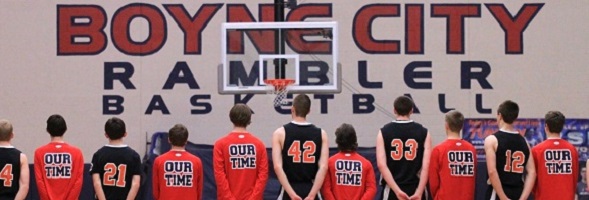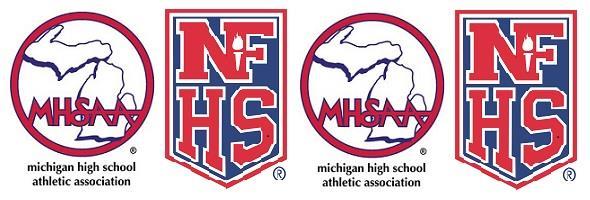
Graduation of Multi-Sport Athletes
December 8, 2014
By David Smith
Boyne City athletic director
Editor’s Note: This is reprinted with permission from the Petoskey News-Review, which is publishing semi-regular columns written by athletic directors for the northwest region of the Lower Peninsula. Click for more sports coverage from the News-Review.
There are many important topics today that relate to high school sports. I was honored when asked to write a brief column about a current topic of my choice in the high sports world. This particular topic, student-athletes specializing in one sport, is something that is happening more and more.
It’s hard to pinpoint exactly why this is, but it often times seems to boil down to unrealistic expectations from several parties that an athlete is capable of being a legitimate college or higher-level athlete.
Don’t get me wrong, we have a plethora of outstanding athletes in Northern Michigan. The facts are, however, that about 98 out of 100 high school athletes never play collegiate sports of any kind at any level. Also, less than one percent of high school athletes receive a scholarship of any kind to a Division I school.
I don’t want to tell someone not to have that dream. In fact, I think that is an awesome dream to have. I had that goal growing up and was fortunate to be able to play a few different sports at a small Division III college. It helped me grow immensely as a person, and I’m very thankful for that experience. I just can’t emphasize enough how we need to all have realistic expectations for our student athletes, whether it’s the athletes themselves, or parents, coaches, administrators, etc.
I think one thing we can all do to help this is to emphasize the process more than the outcome. The funny thing is getting the process right and enjoying it almost always leads to positive outcomes. The process is where all the hard work is put in. The process is where good character is developed, and that’s one of the most important traits we can help young individuals develop.
Many high school athletes are also too busy and compete too much. The amount of young athletes competing year-round for sports is getting out of control. Sure, sometimes it works out and an athlete will really improve by doing this, but more often than not, they get burned out and when it’s actually that sport in-season, they are toast and go through the motions. I know from a coaching standpoint I want athletes hungry to compete every time out.
Being that busy also means very little time for athletes to improve their overall athleticism (stronger, faster, quicker, more explosive, better endurance, etc.). Skills take a back seat too because most athletes are just playing games and not focusing on skill work. I’d rather take an athlete who trains to become more athletic and works on skills for several months than one who plays AAU or something of that nature. I know that has its place for a very few individuals, but most young athletes need way more work on their athleticism and skills before being ready for something like AAU.
I get specializing in one sport if you are undoubtedly a Division I athlete that will likely play professionally. Or maybe it’s someone who goes to a big high school and they aren’t very talented so the only way they can play is to focus really hard on one sport. I get those occurrences.
I would argue, however, that even the Division I-type individuals will nine times out of 10 benefit more from playing another sport because they aren’t going to work hard enough by themselves to make the gains. They would then also be refreshed and ready to get after it once the season arrives. With that, our schools up here will always have a hard time competing at the regional and state level if we don’t have all of our best athletes playing two or three sports. It blows me away how good some of our teams in the area could fare if this happened.
This column is not meant to be negative. It’s just some food for thought. I haven’t been at this very long, but it’s something I’ve seen happen more and more in the last 10 years. I’ve just always been a big fan of the multiple sport athlete and experienced first-hand how much a school can benefit when a group of talented athletes go through and they all play a minimum of two sports.
At the end of the day, we cannot forget what I’d consider the main purpose of athletics at this level. That is, to help young individuals leave our schools with experiences and life lessons that will help them as they pursue careers and go on with other facets of their lives.

Become an Official: HS Sports Need You
January 24, 2018
By Bob Gardner, Executive Director of the National Federation of State High School Associations
and Mark Uyl, Assistant Director of the Michigan High School Athletic Association
They don’t make the headlines, their names are not in the box scores and they don’t make the all-star teams. But perhaps the most important individuals in high school sports are the contest officials.
These individuals are so important that, in fact, there would be no organized competitive sports at the high school level without the men and women who officiate these contests every day across the country. Subtract the dedicated men and women who officiate high school sports, and competitive sports would no longer be organized; they would be chaotic.
In some areas of our country, high school officials are retiring faster than new ones are being added. And junior varsity, freshmen and middle school games are being postponed – or even cancelled – because there are not enough men and women to officiate them.
Anyone looking for a unique way to contribute to the local community should consider becoming a registered high school official. For individuals who played sports in high school, officiating is a great way to stay close to the sport after their playing days have ended. Officiating helps people stay in shape, expands their social and professional networks and offers part-time work that is flexible, yet pays. In fact, officiating is a form of community service, but with compensation.
Another benefit of officiating is that individuals become role models so that teenagers in the community can learn the life lessons that high school sports teach. Students learn to respect their opponents and the rules of the game and the importance of practicing good sportsmanship thanks, in part, to those men and women who officiate. And the objectivity and integrity that high school officials display is an example that every young person needs to observe firsthand. In short, communities around the country will be stronger because of the life lessons that high school officials help teach the next generation.
Officiating is a great way to stay connected to sports and to give back to the local high school and community. We need dedicated men and women to become involved so that high school sports can continue to prosper for years to come.
Individuals interested in learning more about becoming a high school official, and even beginning the application process, can do so at www.HighSchoolOfficials.com.

